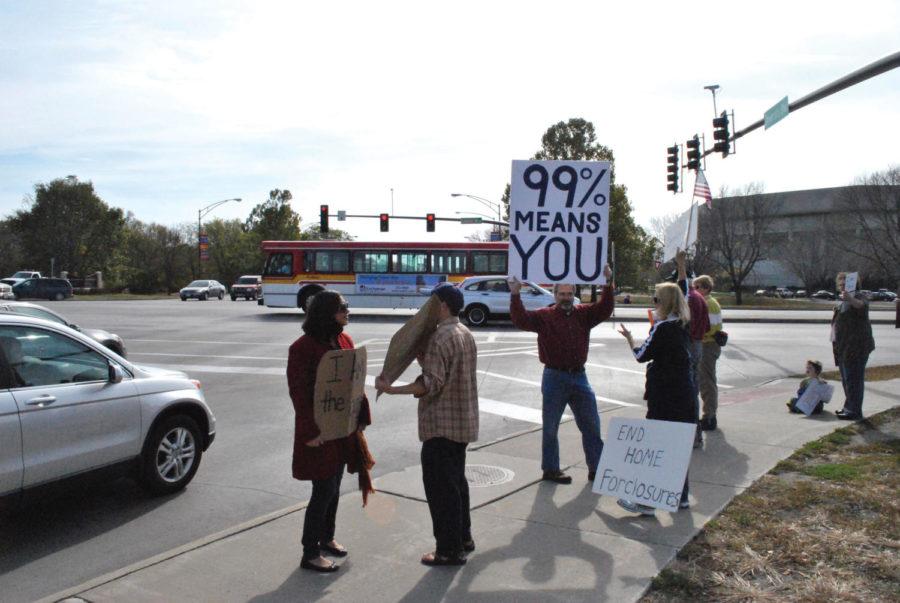Belding: Occupy protesters should reconsider methods, goals
Photo: Jordan Maurice/Iowa State Daily
Occupy Ames makes its way to Linclon Way while protesting the current state of our economy Saturday, Oct. 22. The group had previously protested in downtown Ames on Friday.
October 31, 2011
Protesters in the Occupy-quasi-movement-thing (what is it, exactly?) are protesting (what, exactly?). Beyond vague generalizations, I don’t know what it is they’re mad as hell about. I don’t know what they’re not going to take anymore, either. Protesting the fact that 1 percent of the population owns 40 percent of this country’s wealth will not change anything. Wealth will not be redistributed; loans will not be forgiven.
For starters, their methods are horrible. Occupying Wall Street and public parks? How will occupying an area solve anything? It won’t. They’re not debating. They’re not staking out an intellectual or political position and offering evidence to support it. They’re just obstructing people from going about their lives, if they’re doing anything. There is little difference between the “occupying” done by the protesters and that done by the robber barons who founded the Wall Street banks over a century ago.
Both identified something they wanted and took it. Taking without permission is taking without permission, whether it be the rich or the poor doing the taking and whether done by government or by looters. Wealth gained legally is wealth that should not be subject to confiscation.
Every person should have to pay his or her fair share of taxes, as determined by the tax code on the books. But demanding that the wealthy give theirs away when it has been earned without legal impediment is demanding that they give away what is rightfully theirs.
Second, the Occupy movement is nonsense. The only thing the government can do to “level the playing field” is repeal laws that only affect portions of society. And in our country we are all subject to the same laws. The reason the wealthy got that way is because of our economy. Our capitalist system allows any individual with a good idea to become a millionaire. It should come as no surprise that wealth requires a combination of marketing skills, selling skills, administrative skills and human interaction. We should not be surprised that hard work put into the right activities delivers tangible benefits.
How many of you go to class, read, do your homework, visit your professors and still don’t do as well as some students who attend class sporadically and are behind on the readings and homework? Chances are good that you haven’t identified how much work is necessary in which areas. The same goes for business. Not only does wealth require bold daring and a willingness to be financially insecure as a business is started, wealth requires an ability to see to the heart of the matter. Often successful businessmen make it seem so easy.
To them, it is. The human instinct to “truck, barter and trade,” as Adam Smith put it, is truly second nature to them the same way some people are instinctively able to gain political support, or how some musicians (think Mozart) are apparently born with their genius.
One friend showed me a YouTube video juxtaposing clips of President Obama and Secretary of State Clinton speaking about the political revolutions in North Africa, the “Arab Spring” — Egypt, Tunisia, Libya, etc. — with their absence of comment about the Occupy Wall Street protesters. There is a fundamental difference between the two.
Political change and economic change are not the same. Economics is just the way things are. Unless you can manage to make large-scale boycotts over a long period of time or create your own businesses that operate according to your own ideals whose profitability drives out the businesses against which you protest, nothing will change.
The millionaires aren’t going to give it up themselves. The system benefits them. If the Occupy-ers would take advantage of the same laws the robber barons take advantage of, they would replace them. Looking to politicians to solve an economic problem is a waste of time. Politics isn’t about interest; it is about interaction. To the extent that politics is profitable to you, it isn’t politics.
Until the political order uses its coercive power to make the economy operate so it benefits the 99 percent, the convenience of our economy will ensure its existence. It is so much easier to just keep things the way they are than to go out and protest, missing work, class and other obligations. Until the direct interest of the 99 percent is connected the reforms demanded by the Occupy movement — until it is more economical for Americans to protest — nothing will change.







